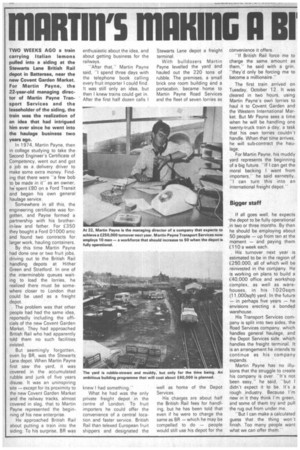MARTIN'S mmuNG A RI'
Page 38

If you've noticed an error in this article please click here to report it so we can fix it.
TWO WEEKS AGO a train carrying Italian lemons pulled into a siding at the Stewarts Lane British Rail depot in Battersea, near the new Covent Garden Market. For Martin Payne, the 22-year-old managing director of Martin Payne Transport Services and the leaseholder of the siding, the train was the realization of an idea that had intrigued him ever since he went into the haulage business two years ago.
In 1974, Martin Payne, then in college studying to take the Second Engineer's Certificate of Competency, went out and got a job as a delivery driver to make some extra money. Finding that there were "a few bob to be made in it" as an owner, he spent £80 on a Ford Transit and began his own general haulage service.
Somewhere in all this, the engineering certificate was forgotten, and Payne formed a partnership with his brotherin-law and father. For £350 they bought a Ford D1000 artic and found two contracts for larger work, hauling containers, By this time Martin Payne had done one or two fruit jobs, driving out to the British Rail handling depots at Hither Green and Stratford. In one of the interminable queues waiting to load the lorries, he realized there must be somewhere closer to London that could be used as a freight depot.
The problem was that other people had had the same idea, reportedly including the officials of the new Covent Garden Market. They had approached British Rail who had apparently told them no such facilities existed But seemingly forgotten, even by BR, was the Stewarts Lane depot. When Martin Payne first saw the yard, it was covered in the accumulated rubble and junk of five years disuse. It was an uninspiring site — except for its proximity to the new Covent Garden Market and the railway tracks, almost covered in slag, that to Martin Payne represented the beginning of his new enterprise He approached British Rail about putting a train into the siding. To his surprise, BR was enthusiastic about the idea, and about getting business for the railways.
"After that,Martin Payne said, -I spend three days with the telephone book calling every fruit importer I could find. It was still only an idea, but then I knew trains could get in. After the first half dozen calls I
knew I had something."
What he had was the only private freight depot in the centre of London. To fruit importers he could offer the convenience of a central location and faster service. British Rail than telexed European fruit shippers and designated the Stewarts Lane depot a freight terminal.
With bulldozers Martin Payne levelled the yard and hauled out the 220 tons of rubble. The premises, a small brick one room building and a portacabin, became home to Martin Payne Road Services and the fleet of seven lorries as well as home of the Depot Services His charges are about half the British Rail fees for handling, but he has been told that even if he were to charge the same as BR — which he may be compelled to do -people would still use his depot for the convenience it offers.
"If British Rail force me to charge the same amount as them," he said with a grin, "they'd only be forcing me to become a millionaire."
The first train arrived on Tuesday, October 12. It was cleared in two hours, using Martin Payne's own lorries to haul it to Covent Garden and the Western International Market. But Mr Payne sees a time when he will be handling one twenty-truck train a day, a task that his own lorries couldn't handle, When that time arrives, he will sub-contract the haulage.
For Martin Payne, his muddy yard represents the beginning of a big future. "If I can get the moral backing I want from importers," he said earnestly, "I can turn this into an international freight depot."
Bigger staff
If all goes well, he expects 'the depot to be fully operational in two or three months. By then he should be employing about 50 people — up from ten at the moment — and paying them £110 a week each.
His turnover next year is estimated to be in the region of £250,000, all of which will be reinvested in the company_ He is working on plans to build a £40,000 office and workshop complex, as well as warehouses, in his 1020sqm (1 1,000sqft) yard. In the future — in perhaps five years — he envisions erecting a bonded warehouse.
His Transport Services company is split into two sides, the Road Services company, which handles general haulage, and the Depot Services side, which handles the freight terminal. It is an arrangement he intends to continue as his company expands, Martin Payne has no illusions that the struggle to create his company is over. "It's not been easy," he said, "but I didn't expect it to be, Ifs a rough industry, Because I'm new in it they think I'm green, and some of them try and pull the rug out from under me.
''But I can make a calculated guess that the thing won't finish, Too many people want what we can offer them.








































































































